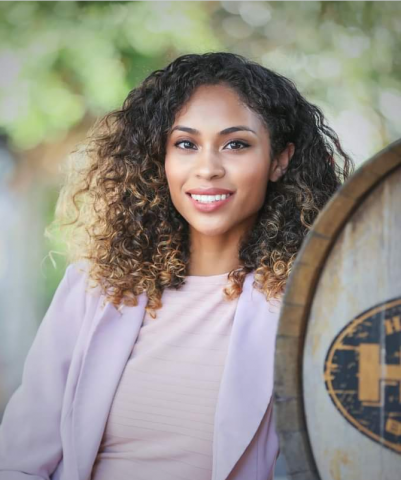 Healdsburg Councilwoman Skylaer Palacios
Healdsburg Councilwoman Skylaer Palacios
photo credit: (Credit: Courtesy, City of Healdsburg)
Skylaer Palacios says she had no wish or intention for the spotlight.
But proceedings on November 1st, forced the hand of the Healdsburg councilwoman.
That was when her colleagues opted to resume in-person meetings. Palacios says she felt little choice but to reveal that she's unvaccinated.
Sensing a potential firestorm, she released a 17-minute video explaining her hesitancy.
"I think vaccines are an effective tool to help alleviate the pandemic, but I believe strongly in personal choice. I also have a hard time supporting something that I myself haven't taken. I believe that is disingenuous."
But in a deadly pandemic that's become a political fault line, a rush to judgement is perhaps unsurprising.
About a week after the video went up, Palacios was weathering the fallout.
"I'm anxious a lot of the time, I've taken a bit of a break from Facebook because, that is of course debating people and it turns ugly pretty quick, and that's just how social media typically is. For those that are willing to contact me directly, either through email or Facebook messenger or text, overwhelmingly positive. In terms of the negative, it has been, there's people asking questions, questioning my logic, but there's also people that are scared. I knew that was going to happen. I know that there is a lack of understanding about where I am coming from, and that's normal, but in terms of the negative I have had two people ask for my resignation. I've had a few people, five to ten maybe say that they're disappointed in my, either speaking out or talking about the situation. To clarify, it's not something I wanted to talk about, it's something I felt I had to in a council meeting because of the decision that was being made on council because I was already put in a position where I felt I had to."
That decision was to require proof of vaccination for in-person meetings. The unvaccinated, can still join by zoom.
Palacious said she felt backed into a corner. "It's not like, I freely want to expose my medical information, that was not my intent."
With many outlandish claims circulating, and the divisive political context, nuance can prove difficult to transmit. She cites a list of reasons for her skepticism, but perceives one as an obvious, direct, threat, "Overall, allergic reaction. I am afraid of anaphylactic shock." Palacios says she's experienced that before, and fears the vaccine could trigger a life-threatening episode.
That the formulations are proprietary and undisclosed, while drug makers are mostly shielded from liability, doesn't lift her unease.
But it goes further than that. She mentions a long history of drugs, therapies and medical devices causing harm, death and misery. And, she's not wrong. From Thalidomide, to DES and the Dalkon Shield, or faulty artificial knees...they're are all part of medical history.
"It's found out years later sometimes sometimes even decades later, the adverse affects these pharmaceuticals have had."
And, she says minority communities, with awareness of the Tuskegee experiment, or more recent revelations about the case of Henrietta Lacks, are naturally less inclined now to believe the medical industry, government or drug-makers uncritically.
"I think the questioning, especially, largely by the BIPOC community is completely valid."
Palacios is also personally wary of medical practitioners. She blames her grandmother's death on a system that over-prescribed opioid pain killers during her treatment.
Palacios isn't taking her lead from an internet pillow salesman. She says she digs deep into FDA and CDC guidance, and studies to bolster her understanding. She also says her own doctor assessed her risk for hospitalization or death as very low.
With her reservations, though, she's taken issue with the decision by her council colleagues to bar the unvaccinated from attending meetings in-person. She feels attending by zoom isn't the same for her, and that others who share in her skepticism won't have the same access, or impact on policy.
"My concern is, it's fine if I zoom in, that's how we've been doing council for the last year, but I'm concerned about other members of the public, and I have had people reach out saying that things like they're naturally immune and they feel like they should be able to attend council meetings, but they don't want to get vaccinated. Because the science is not conclusive, I question the policy that governments are making to exclude unvaccinated people from anything, especially essential services like government and education. That is just, we're talking about separate but equal policies at this point."
Palacios said she's saddened by the political division over the vaccine. While it's unclear how to reduce hesitancy among those believing far-fetched claims, such as the vaccine contains tracking chips or causes magnetism in those receiving it, she does think some of the reluctant can be assuaged.
"Before many people that are skeptical about this vaccine would feel comfortable, there has to be a level of acknowledgement, and right now, that's not happening, from pharmaceuticals, from the CDC, from the FDA."
 Healdsburg Councilwoman Skylaer Palacios
Healdsburg Councilwoman Skylaer Palacios  Healdsburg Councilwoman Skylaer Palacios
Healdsburg Councilwoman Skylaer Palacios